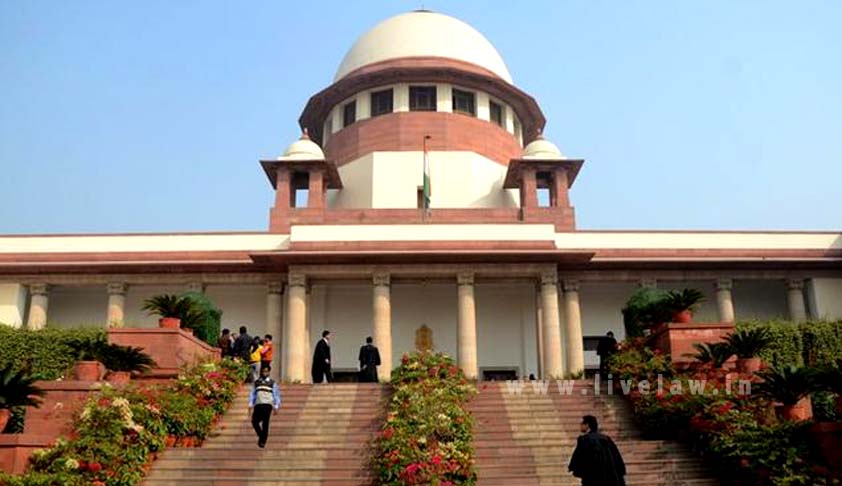NJAC - Misadventure of Elected towards Tyranny
Ashish Dixit
26 Oct 2015 12:00 PM IST

On 16th October, 2015, the Apex Court subdued mischievous attempt by the Executive to curtail the independence of ‘watchdog’ of this Country. Being one of the Petitioners in the matter, it gave me immense joy that Supreme Court rose up to the occasion and delivered what can be humbly termed as a ‘historic’ judgment. The 99th Amendment of the Constitution and NJAC Act were struck down by the Supreme Court as it impinged upon Independence of the Judiciary.
But what followed next disturbs me as a citizen of this Country. The manufactured and unanimous outcry by politicians and the lawyers who appeared to defend NJAC needs strong condemnation. After failing to convince Hon’ble Supreme Court as to the vires of the 99th Constitution Amendment and the NJAC Act, these opinions can only be termed as ‘outburst of overruled litigants’.
Much criticism of the judgment is on the premise that it ignores the ‘Will of the people’, as the law was enacted by Parliament unanimously and ratified by 20 States. I beg to differ here because law in all circumstances cannot be Will of the people alone. If that is permitted, then considering the prevailing atmosphere, lynching of people on trivial allegations must be considered as Will of people . For the sake of argument let’s presume for a moment that Parliament is repository of people’s Will, but can any political party of the Country claim that people voted them to power, so as to enable them to subjugate the process of appointment of judges? Certainly NOT. Further the ‘Will of the people’ argument has been blown out of proportion. In a democracy, the government is elected by ‘Will of the people’ but it does not function as per the Will of the people, rather it functions on the principle of law and equity.
Another argument which has been raised in favor of NJAC is that no other Country in the World has a system of this kind. What lays forgotten is that no other Country has lived through a dark chapter in its history being the Emergency. Mr. Jaitley wrote that it was the Supreme Court who caved in during Emergency, and I respectfully agree with him; but what he does not mention is that it was corollary of the fact that appointments were made under the influence of Executive. Per contra, Supreme Court of post collegium era i.e. today, refused to cave in before current polity and delivered judgment which rebuts and rebukes the idea of Executive interference in Judicial Appointments. In fact this judgment demonstrates strength of collegium system because every government would want pliable Judiciary in order to exercise a free hand.
It is argued in support of NJAC that even Constituent Assembly debates indicate that primacy of CJI was never intent of Constitution framers. A simple reading of Second & Third Judges case makes it patent that CJI acts on the opinion of collegium and CJI being caput familia of Indian Judiciary conveys that opinion. It also needs to be noted that during Constituent Assembly debates, enormous emphasis was given to Article 39-A (now Article 50) which mandates separation of Executive from Judiciary. In fact first Prime Minister of India said in the debate that ‘…I may say straight off that so far as the Government is concerned, it is entirely in favour of the separation of judicial and executive functions (Cheers). I may further say that the sooner it is brought about the better (Hear, hear)…’. It is manifest that Constituent Assembly intended that there should be a clear separation of powers between Judiciary and Executive.
The Independence of Judiciary is guaranteed by the Constitution of India. The United Nation has adopted a resolution which says “The independence of the judiciary shall be guaranteed by the State and enshrined in the Constitution or the laws of the country. It is the duty of all governmental or other institutions to respect and observe the independence of the judiciary”. A judge should be independent from inception, and therefore, his appointment becomes the most crucial factor. One of the eminent lawyers defending NJAC argued that independence is only ‘post appointment’, which, excuse my saying it, is an absurd submission per se. Let me take a hypothetical example: If Executive appoints a person affiliated to its ideology, how will that person be expected to become independent overnight post his appointment? Unfortunately, the oath which Judges take is not medicine which can erase allegiance & unwanted memories. The appointment becomes even more crucial because of exceptional process of impeachment provided under our Constitution. Thus, if a bad appointment is made, it is likely to stay. Therefore, appointment cannot be left to discretion or at the will of Executive and Legislature.
Immediately after the judgment was delivered Executive deliberately adopted a confrontational attitude. In fact the Union adopted a similar modus operandi during the arguments in the matter, during which the judges were haughtily told that Will of the people is Supreme in Democracy and nothing can prevent Parliament from enacting the laws it wants; even if NJAC is declared null and void. The consequences are there for all of us to see. The “will of the people” sincerely hopes that wisdom will prevail upon Executive and it shall positively contribute in improving the existing and less tyrant collegium system.
Another error which is pointed out in the judgment is that after quashing 99th Amendment, the Supreme Court re-legislated Article 124 and 217. This is one of the most bizarre criticisms because while doing so, people became oblivious to the elementary principle of law. The 99th Amendment Act amended Article 124 and 217 and added Articles 124A, 124B, 124C for appointments of Judges of Supreme Court and similar amendments/additions were done for High Court Judges. It has to be borne in mind none of the Articles were ‘repealed’ and the 99th Amendment had no repealing clause. Therefore, if the amendment as envisaged by the amending act is quashed, then the status quo ante will prevail. The law cannot function in vacuum.
We should be proud of the fact the Supreme Court in its magnanimity and wisdom has invited assistance and suggestions to help improve the collegium system. This shows that Apex Court of this Country is prepared to introspect, a virtue that eludes Executive and polity of this Country.
Amidst this unwarranted and undemocratic criticism of Hon’ble Supreme Court, I am reminded of the words of Lord Templeman who paid his tribute to the collegium system in following words “… having regard to the earlier experience in India of attempts by the Executive to influence the personalities and attitudes of members of the judiciary, and having regard to the successful attempts made in Pakistan to control the judiciary and having regard to the unfortunate results of the appointment of Supreme Court Judges of the United States by the President subject to approval by Congress, the majority decision of the Supreme Court of India in the Advocates-on-Record case marks a welcome assertion of independence of Judiciary and is the best method of obtaining appointments of integrity and quality, a precedent method which the British could follow with advantage…”.
 Ashish Dixit is a Practising Lawyer at Delhi High Court and Supreme Court of India.
Ashish Dixit is a Practising Lawyer at Delhi High Court and Supreme Court of India.
The Views expressed above are personal only and it does not reflect the view of Live Law.


